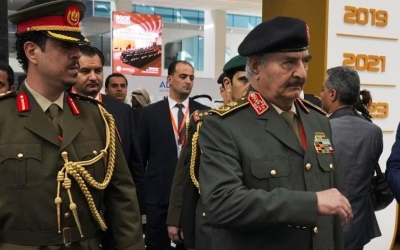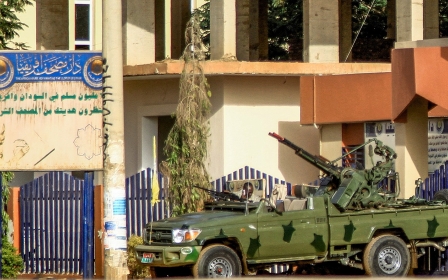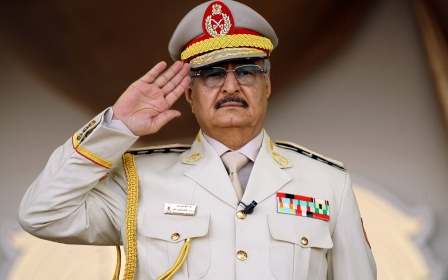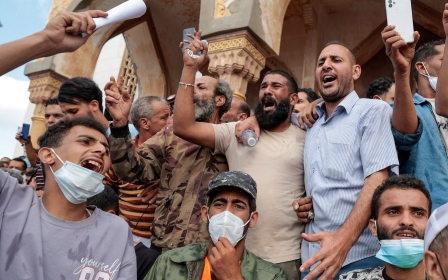'Crumbling': Libya's warring factions dig in for fight over oil profits
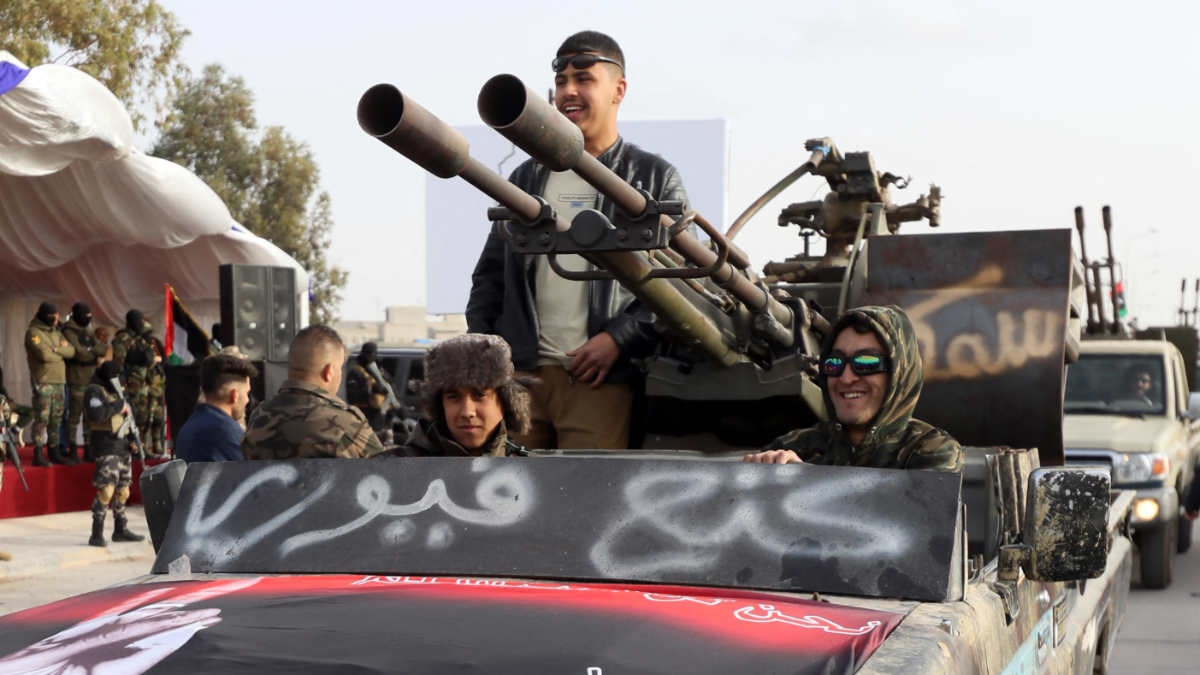
Libya’s oil production and exports plunged on Thursday as warring political factions appear to be digging in for a feud over control of the war-ravaged country’s central bank and the petrodollars it holds.
The closure of oil fields and terminals across eastern Libya slashed the Opec member’s production by roughly 700,000 barrels per day, analysts told Middle East Eye.
Libya, home to Africa’s largest proven oil reserves, was producing about 1.2 million bpd this year. Brent crude was trading up 1.3 percent on Thursday.
Analysts at energy firm Kpler said the shutdowns are rippling across markets. "Key Mediterranean players are watching the Libyan escalation with great concern," according to a market report shared with Middle East Eye.
"Libya is poised to become the most significant wild card in the oil markets of 2025," the report added.
New MEE newsletter: Jerusalem Dispatch
Sign up to get the latest insights and analysis on Israel-Palestine, alongside Turkey Unpacked and other MEE newsletters
The closures are a result of a dispute between Libya’s rival governments for the reins of the central bank in Tripoli, which controls the cash generated by the country’s oil sales.
On one side is Abdul Hamid Dbeibah, the prime minister of Libya’s UN-recognised government based in Tripoli, who wields an alliance of powerful militias. On the other side, is Field Marshal Khalifa Haftar, who controls a rival government based in the country’s east.
While Libya’s central bank is located in Tripoli, the bulk of its oil reserves and infrastructure are located in the east.
The two governments fought a bloody civil war after Haftar’s army tried to take Tripoli, but over the last two years, they reached an uneasy stalemate, based on their mutual interest in dividing up Libya’s energy resources among themselves.
“The central bank was the key cornerstone of this relative stability, which is based on an informal revenue sharing deal between Dbeibah and Haftar,” Riccardo Fabiani, director of the North Africa Project at the International Crisis Group, told Middle East Eye.
Fight over Libya's central bank
The crisis started in August when the central bank was besieged by armed militants who reportedly tried to force the bank’s long-time governor, Sadiq al-Kabir, to resign.
Then, the bank’s head of information technology was kidnapped. He was released, but the move prompted the bank to suspend operations, jolting the local economy.
'There is no sufficient external backing for a wider war. Turkey, Egypt and the UAE don’t think they can win one'
- Riccardo Fabiani, International Crisis Group
On 18 August, Libya’s presidential council, which is aligned with Dbeibah, unilaterally announced it was firing Kabir.
In response, Libya's eastern government said it was suspending all oil production and exports, declaring that "outlaw groups" had tried to seize "Libya's most important financial institution".
The rift started because Dbeibah appeared frustrated with Kabir who has run the bank since 2012 and was previously viewed as a Dbeibah ally, analysts say. But Dbeibah resented the level of cash that has been flowing to Haftar.
He believed he was getting the short end of the informal revenue-sharing deal.
“The system was working more in a way that seemed to favour Haftar," Fabiani said.
"A lot of money has been flowing into construction projects in the east. There is money left and right from smuggling there, but less in Tripoli."
'Hell-bent on power'
Dbeibah came to office in a 2021 power-sharing deal brokered by the UN. His government was supposed to be temporary, with the job of steering Libya to elections, and an eventual deal to unify the country’s east and west, but those elections have yet to materialise.
Analysts say the central bank dispute reveals that Tripoli’s government has no intention of stepping down. With no deadline for elections or term limits, they say leaders in Tripoli have been cementing control of other institutions like the National Oil Company (NOC).
“The Dbeibah family is hell-bent on staying in power. As a family, they want to be on the same level as the Haftars,” Jalal Harchaoui, a Libya expert at the Royal Service Institute, told Middle East Eye.
Libya splintered into warring factions after the overthrow and death of Muammar Gaddafi in 2011. Fighting in the strategic, energy-rich country soon descended into a proxy war with foreign powers backing opposing sides.
Haftar, a former Qaddafi general and CIA asset, made a failed bid to capture Tripoli.
Libya’s conflict sucked in external powers, with Turkey backing the government in Tripoli and Egypt, and the UAE and Russia supporting Haftar.
Today, Turkey- and Russia-linked mercenaries are deployed in Libya, but foreign powers have diversified their relationships across the east and west since 2021, experts say.
US shuttle diplomacy
Libya's instability has been overshadowed by Israel’s war in Gaza and tensions with Iran, but the latest showdown has unnerved foreign powers, who experts say don’t want to see a return to war.
On Tuesday, the US top commander in Africa, General Michael Langley, met with Haftar and visited Dbeibah in Tripoli on Thursday. Analysts say the shuttle diplomacy is a bid to decrease tensions.
'The Dbeibah family is hell-bent on staying in power... they want to be on the same level as the Haftars'
- Jalal Harchaoui, Royal Service Institute
“Very influential states, like the US, are very afraid of a physical war in Tripoli,” Harchaoui said. But he added that the local actors may see that fear as an opportunity to stake out even harder-line positions, Harchaoui said.
“If you look unreasonable, you can scare this lame-duck (Biden) administration,” Harchaoui added.
Fabiani said Haftar and Dbeibah would need financial and military support from regional states that have no interest in another war erupting.
“There is not sufficient external backing for a wider war. Turkey, Egypt and the UAE don’t think they can win one. The serious risk is that one erupts by accident," Fabiani said.
However, Russia's top Middle East official held a phone call on Wednesday with Haftar's top diplomat and vowed to strengthen security ties. Russian mercenaries support Haftar.
Another risk, Fabiani said, could be if the tensions prevent government salaries from being paid or spark a battle between militias that spiral out of control. Libya's oil revenues recently accounted for half of the country's GDP.
“Things aren’t escalating so much as they are crumbling.”
Middle East Eye delivers independent and unrivalled coverage and analysis of the Middle East, North Africa and beyond. To learn more about republishing this content and the associated fees, please fill out this form. More about MEE can be found here.


